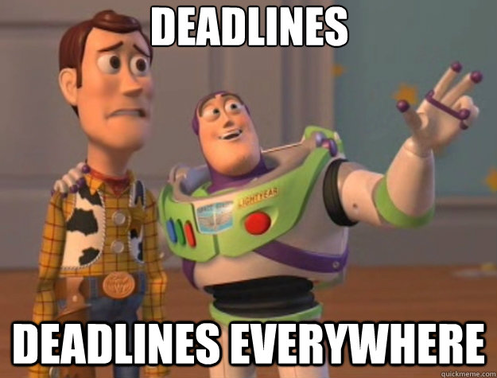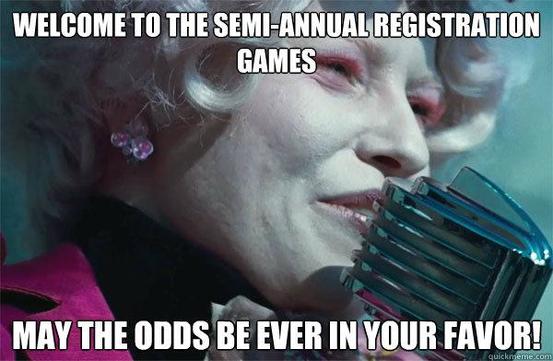|
In high school, classrooms felt personal. You likely had relatively small classes and interacted closely with your teachers and other students. Teachers would prompt you to turn in assignments and actively help you to stay on track.
If you are like most students, walking into your first lecture hall with hundreds of other students will blow your mind! In a large lecture hall the professor can seem like they are a million miles away. It can feel intimidating to raise your hand and ask a question in front of so many other students. Professors will not be personally checking up on you to see if you come to class or turn in your work. You are now accountable for staying engaged and on top of your academic load. But just because you are in a large class doesn’t mean that your experience has to be impersonal. Here are some tips to shrink that ocean-sized class into a small pond experience:
|
- Go to the professor’s office hours. Remember, the professor is there to teach you about the topic. They have expertise in the field and can help you to better understand concepts that are difficult. They also love to talk about their area of work, so in talking to them you will likely learn a lot more than they can even cover in lecture.
- Form study groups. Oftentimes large classes will also have small sections led by a TA which will give you an opportunity to meet other students, ask questions, and get more guidance about the work you are doing. Forming a study group with your peers can extend this discussion and give you opportunity to practice teaching each other the concepts you are studying (being able to clearly explain and answer questions about concepts to others is one of the best ways to prepare yourself to apply your knowledge more flexibly on a test!).
|
The quarter system moves fast.
For each of your classes, you will likely cover in 10 weeks the amount of material that you would have covered over the course of a whole year in high school. On your first day of class you will get your syllabus with the readings, assignments, and exams that you will have throughout the term. There is no warming up period…work begins on Day 1. Before you know it, problem sets will pile up, midterms will creep up on you, and papers will be due. The accelerated pace, increased rigor, and looming deadlines requires you to be consistent with studying and use your time efficiently to be able to get it all done. Students often get themselves in trouble when they think that just because they don’t have class, they don’t have anything to do that day. Think of school as your full time job and schedule accordingly. Here are some tips to tackle all that you have to do with greater ease:
|
- Consider what you can reasonably get done in the chunks of time that you set aside. For example, if you know that you have an hour in between two of your classes, perhaps you can read part of a chapter or outline the paper you have to write during that time. Starting a “big” task that requires more time and concentration when you only have a small chunk of time may be more frustrating than productive. But don’t forget, all “big” tasks need to be broken down into smaller chunks so perhaps you can chip away at it in those periods too.
- Make time for breaks! On a good day, most students have the capacity for 45 minutes of work before their attention and concentration start to wander. On a tougher day, you might need to take breaks more often.
- Do the tasks that need more of your brain power earlier in the day when your energy is highest. If you try to do a difficult task when you are tired, you will likely take longer and it will be more challenging to complete the task when you are not operating on a full battery.
|
In high school you had lots of assignments and exams over the year so that any one of them wouldn't tank your final grade. However, in college most assignments and exams are higher stakes. For example, it’s not uncommon for a single test to be worth 40% of your grade. Thus, each assignment and exam carries a lot more weight towards your final grade. So, keeping up with your studying and getting work done efficiently is essential to doing well in your classes. Here’s how to help you manage the onslaught of assignments and exams that will come your way:
|
|
“Pass times”---the opportunity to vie for coveted seats in classes that everyone else is also trying to get into. It is inevitable that at some point you will likely not be able to register for a class that you had hoped to get into. Don’t stress out! That doesn’t mean you’ll never be able to take that class. You just might need to take it in another term.
Nonetheless,the thought of not getting the class you need or want during registration can be very stressful. Here are some ways to make this process feel more manageable:
|
- Have a back-up plan. As the Rolling Stones once said “you can’t always get what you want”. So, that means you need to have some viable alternative classes that you want to take. Preparing for plans B, C, D, etc. will make registration easier.
- Be open to exploring different areas of study. Some students know from the start exactly what major they want to pursue and they end up sticking with it throughout their time at UCSB. However, more often than not, students will develop new interest and find their skill in areas that they might not have initially considered. So, make sure to take the opportunity to try out classes that just sound fascinating. You may be pleasantly surprised by what gets sparked in you and what amazing new things you can learn.
Proudly powered by Weebly




